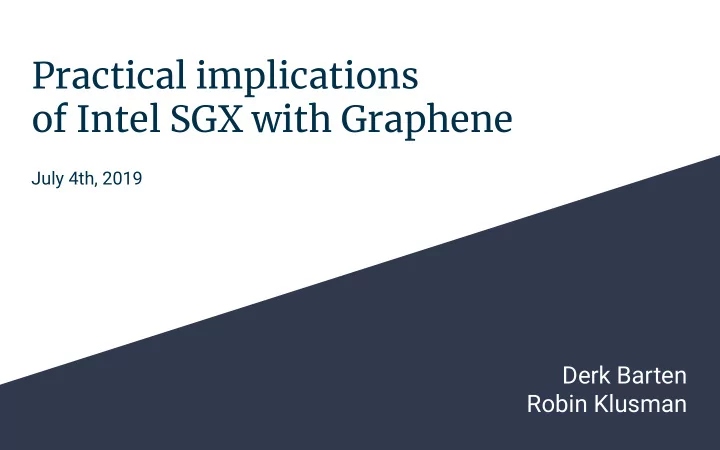

Practical implications of Intel SGX with Graphene July 4th, 2019 Derk Barten Robin Klusman
Software Guard ● Untrusted system Trusted enclave ● Extensions Attestation ● (SGX) ● Encrypted & isolated memory ● Integrity, confidentiality, isolation 2
Graphene-SGX ● Library OS Standard C library ● Unmodified applications ● ● Multi-process support ● Dynamic shared libraries Manifest ● 3
Related work ● SGX DRM, Anti-cheat ○ Use-cases Compilers ○ ○ TLS termination ○ Databases System logs ○ Middleboxes ○ ● Graphene ○ No modifications required Reduced development effort ○ Facilitate SGX research ○ 4
Related work ● Cache side channel attacks Foreshadow ○ Existing attacks SgxPectre ○ on SGX ○ BranchScope ○ CacheZoom Asyncshock ● Controlled channel ● 5
What are the practical implications of running arbitrary applications in Intel SGX using Graphene-SGX? Research Question 6
Security implications
Misaligned ● Intel SGX Operating system = untrusted ○ threat model ● Most applications ○ Operating system = trusted 8
Arbitrary applications are often not designed to guard against a malicious operating system. 9
Iago attacks ● Attacks by malicious kernel System calls ● ● Mitigation ○ Verification 10
Date / time ● gettimeofday() Reliant on OS supplied vDSO ● manipulation Not verified by Graphene ● ● Implications Transaction order ○ Kerberos ○ ○ 2FA token validity ○ Rate limiting 11
Date / time manipulation demo 12
Environment ● Arbitrary environment vars Not present in manifest ● variable Not checked by Graphene ● manipulation ● Easily overlooked Implications ● Influence execution ○ ○ GCC Epoch 13
Framework maturity
Running ● OS version support Framework bugs ● applications Disk writes ● in Graphene ● Non trivial to port complex applications 15
Discussion & conclusions
Discussion ● Security may be compromised Can be mitigated ● Graphene as research project ● ● Not ready for production 17
Developers should take care when running arbitrary applications in SGX using Graphene, as there may be non-trivial security implications and framework bugs. Conclusion 18
Future work ● Explore additional system calls Environment variable dependent ● applications ● Investigate SCONE/Panoply 19
Sources Victor Costan and Srinivas Devadas. “Intel SGX Explained.” Nico Weichbrodt et al. “AsyncShock: Exploiting ● ● In: IACR Cryptology ePrint Archive 2016.086 (2016), pp. synchronisation bugs in Intel SGX enclaves”. In: European 1–118. Symposium on Research in Computer Security. Springer. Chia-Che Tsai, Donald E Porter, and Mona Vij. 2016, pp. 440–457. ● “Graphene-SGX: A Practical Library {OS} for Unmodified Ahmad Moghimi, Gorka Irazoqui, and Thomas Eisenbarth. ● Applications on {SGX}”. In: 2017 {USENIX} Annual “Cachezoom: How SGX amplifies the power of cache Technical Conference ({USENIX} {ATC} 17). 2017, pp. attacks”. In: International Conference on Cryptographic 645–658. Hardware and Embedded Systems. Springer. 2017, pp. Stephen Checkoway and Hovav Shacham. “Iago attacks: 69–90. ● Why the system call api is a bad untrusted rpc interface”. Yuanzhong Xu, Weidong Cui, and Marcus Peinado. ● In: ASPLOS. Vol. 13. 2013, pp. 253–264. “Controlled-channel attacks: Deterministic side channels Ofir Weisse et al. Foreshadow-NG: Breaking the virtual for untrusted operating systems”. In: 2015 IEEE ● memory abstraction with transient out-of-order execution. Symposium on Security and Privacy. IEEE. 2015, pp. Tech. rep. Technical report, 2018. 640–656. Guoxing Chen et al. “Sgxpectre attacks: Stealing intel Dmitry Evtyushkin et al. “BranchScope: A new side-channel ● ● secrets from sgx enclaves via speculative execution”. In: attack on directional branch predictor”. In: ACM SIGPLAN arXiv preprint arXiv:1802.09085 (2018). Notices. Vol. 53. 2. ACM. 2018, pp. 693–707. 20
Software ● Attestation data Attestation key ● Attestation Attestation signature ● 21
Software ● MRENCLAVE - Enclave Identity MRSIGNER - Sealing Authority ● Attestation Public key hash SGX ● Attestation Key in μcode Source: Intel documentation 22
Recommend
More recommend